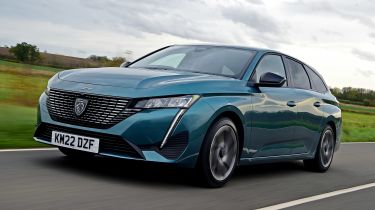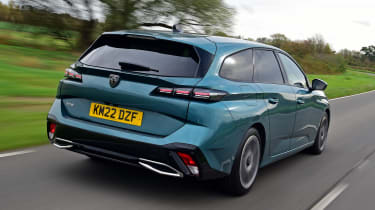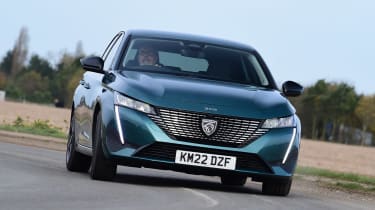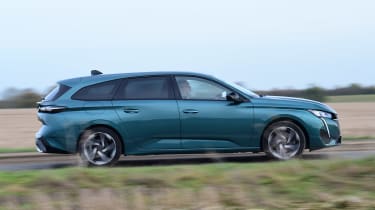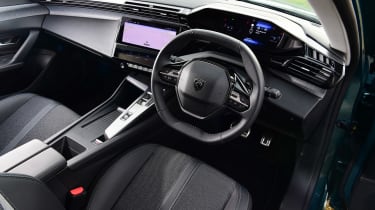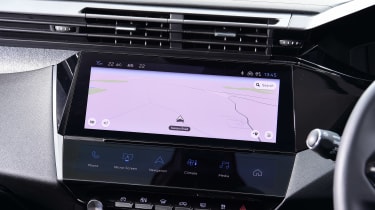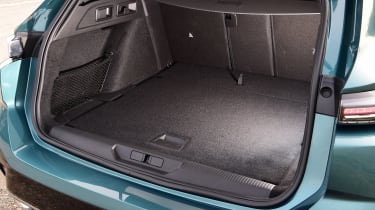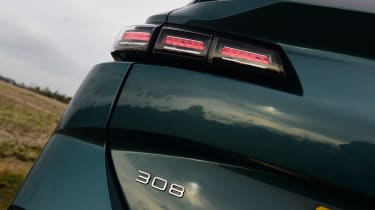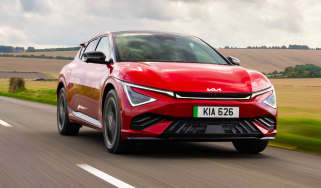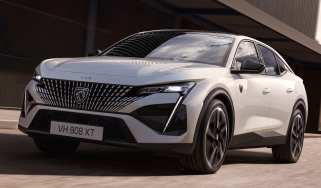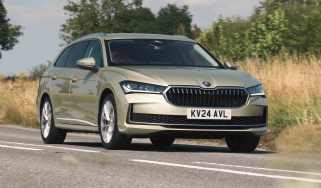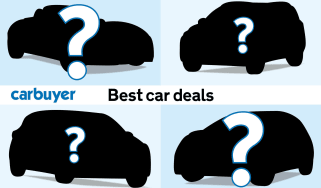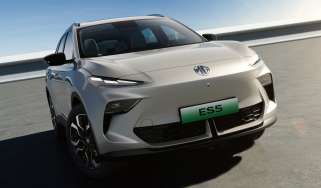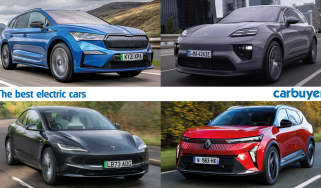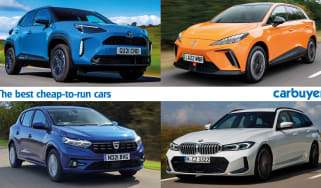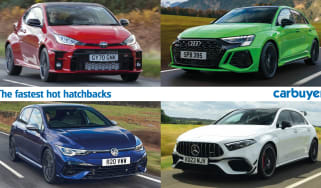Peugeot 308 SW review – even more versatile as an estate
"The Peugeot 308 SW is certainly versatile thanks to a big boot and the option of petrol, diesel, plug-in hybrid or electric power"
Pros
- Efficient engines
- Upmarket interior
- Electric option
Cons
- Poor rear legroom
- Plug-in hybrid can be jerky
- Top-spec models are expensive
Verdict – is the Peugeot 308 SW estate a good car?
While family estate cars don’t tend to be the most desirable cars on sale, the Peugeot 308 SW has a certain panache. Its daring design is doing a lot of the heavy lifting here, with striking looks inside and out. If you don’t mind Peugeot’s i-Cockpit layout, the driving experience is pretty good and the SW scores highly for efficiency, with two plug-in hybrid models to appeal to company-car drivers. There’s a huge boot of course, although some rivals offer comfier back seats.
Peugeot 308 SW models, specs and alternatives
Coming with a range of mild-hybrid petrol, diesel, plug-in hybrid and fully-electric powertrains, the Peugeot 308 is already a pretty versatile car, but it doesn’t stop there because there’s also an estate version called the Peugeot 308 SW. This model adds an extra dose of practicality to the recipe and still looks as striking as the hatchback, while the electric E-308 SW is one of very few EVs on the market with an estate bodystyle.
Rivals to the Peugeot 308 SW include the closely-related Vauxhall Astra Sports Tourer, the Skoda Octavia Estate, Ford Focus Estate and Volkswagen Golf Estate. The E-308 SW’s competitors also include the Vauxhall Astra Sports Tourer Electric and MG5. Buyers may even consider a hatchback-based SUV such as the Peugeot 3008 or Vauxhall Mokka, but the 308 SW will appeal to those that don’t need such a large high-riding car and prefer the driving experience of a traditional low-slung estate.
 Top 10 best automatic cars 2024
Top 10 best automatic cars 2024
Over the years, Peugeot has whittled down the 308 SW lineup so now there are just two trim levels: Allure and GT. That means all cars start with a higher specification than before, so highlights include 17-inch wheels, a heated steering wheel, reversing camera, rear parking sensors, heated front seats, auto high beams and sat nav as standard.
More reviews
The boot measures up to 608 litres in size for the petrol version, shrinking slightly to 548 litres for the plug-in hybrid because of its battery pack. This compares well with the Skoda Octavia, which has between 660 litres and 490 litres depending on its powertrain. The same can't quite be said for the 308 SW's rear seats, however, which are lacking in legroom compared with the Skoda. There are quite a few storage cubbies and the rear seat backs can be dropped quickly and easily using handles in the boot.
The rest of the interior is stylish and upmarket, with Peugeot's quirky i-Cockpit design that uses digital instruments and a small steering wheel. It's attractive but worthy of a test drive to ensure you find it suits your posture while driving.
The standard 1.2-litre petrol engine is no longer available to buy on the configurator at the time of writing, so private buyers are likely to be tempted by the mild-hybrid model (badged confusingly as a Hybrid) and the 1.5-litre diesel. The Hybrid is slightly cheaper than the diesel and can achieve up to 62.6mpg, while the diesel model can do up to 59.6mpg and is best suited to longer motorway miles where it’s the most efficient.
Company-car drivers will be enticed by the two PHEV models, which offer an EV range of up to 42 miles for low CO2 emissions and a low Benefit-in-Kind (BiK) band. An all-electric E-308 SW arrived later and we’ve reviewed that model separately – that model can do up to 257 miles on a charge. No matter which version you choose, the 308 SW has light steering and planted handling with enough punch to easily keep up with traffic.
MPG, running costs & CO2
The 308 SW has been pitched squarely against its rivals, so the petrol and diesel are priced competitively and offer low running costs. They should appeal to private buyers, particularly in low to mid-trim levels, which represent the best value.
The entry-level 1.2-litre petrol is not available to buy as of late 2024 and it’s unknown whether it will return, but it was fairly economical, managing around 45mpg most of the time and it could even top 50mpg on a long motorway run. Now the most affordable 308 SW is the Hybrid, which is more of a mild-hybrid in practice, but is more efficient than the old petrol and costs less than the diesel. It can return up to 62.6mpg and produces 113g/km of CO2.
If you cover serious miles each year, the 1.5-litre BlueHDi diesel could also be worth considering, returning just shy of 60mpg in ideal conditions. For most drivers, however, this isn't a big enough advantage to justify the switch to diesel.
Both plug-in hybrids are fitted with the same 12.4kWh battery, which can provide up to 42 miles of electric range when fully charged. A 3.6kW on-board charger is standard, for a 3.5-hour recharging time, while an optional 7.4kW charger drops this to below two hours.
The fully-electric Peugeot E-308 SW arrived later. It can manage up to 254 miles on a charge of its 54kWh battery according to official figures. Charging speeds are up to 100kW, making a 10-80% top-up at a charging station a 30-minute job.
The electric model’s zero CO2 emissions and the plug-in hybrid’s low CO2 emissions mean they will appeal to company car drivers. The E-308 SW sits in the lowest Benefit-in-Kind (BiK) tax rating, while the PHEVs sit in a still-very-low 12% BiK band.
VED (road tax) is charged at the standard rate for the diesel, while the hybrids are discounted and the E-308 SW is free to tax until 2025, when owners will have to start paying £10 a year. It’s possible to breach £40,000 on a top-spec 308 SW, but do so and you’ll be paying £600 a year in VED until the car is six years old.
Engines, drive & performance
While it's no performance car, the Peugeot 308 SW is available with a 128bhp petrol or diesel engine offering a sufficient turn of speed, or a brace of plug-in hybrids with more power than most owners are likely to need. All cars come with an automatic gearbox.
Like most new cars, the 308 SW's steering is light but accurate, making it easy to position the car's nose precisely on the road. It's fitted with the small steering wheel that forms a part of Peugeot's i-Cockpit interior design, and this can take a bit of getting used to at first. Overall, the driving experience is pleasant although it won’t satisfy enthusiasts quite as well as a Ford Focus Estate.
We've sampled the three-cylinder 1.2-litre PureTech petrol in the hatchback and it comes as standard with an eight-speed automatic transmission. It can get the 308 from 0-62mph in just under 10 seconds, with reasonable punch from low revs. It's also pretty refined, although the Volkswagen Golf's petrol engine is even quieter.
The plug-in hybrid range kicks off with the Hybrid 180, which gets a 1.6-litre petrol engine and an electric motor that gives a combined 178bhp. This gets it from 0-62mph in a brisk 7.7 seconds. There's also a range-topping Hybrid 225, with a more powerful version of the petrol engine for a total of 222bhp. Despite the extra power it doesn’t feel any different to the 180 version, so won't be worth the extra money for most buyers of a small family estate.
Thanks to help from the electric motor, the Hybrid 225 accelerates quickly but the switch to its fully electric mode is slightly clunky. The automatic gearbox is also slightly too slow to change down and we’d like the electric motor to cut in quicker. With 109bhp on tap in pure electric mode, the 308 SW still feels quick enough to be driven in traffic without struggling.
Hybrid models feature regenerative braking that adjusts to your driving style - it comes in stronger if you’ve recently pressed the accelerator hard, and is more subtle if you’re travelling at a more relaxed pace. There are different drive modes in top-spec models, but the Sport setting only increases the weight of the steering and slightly improves the gearbox response. For the most part the engine is quiet and unobtrusive rather than characterful, but that means motorway journeys are impressively hushed.
We’ve tested the Peugeot E-308 SW separately, so read our in-depth review if that’s the version that interests you most.
Interior & comfort
The interior is identical to the hatchback, with classy materials and a neat design. However, there's still the issue that some drivers will find the digital instruments obscured by the top of the steering wheel. We also found the steering wheel itself slightly odd, as it has shiny black plastic trim where you'd normally rest your thumbs. There’s a bit too much of this black trim throughout, which looks good at first but isn’t very scratch-resistant and is a magnet for fingerprints.
Allure trim is now the entry model and it gets 17-inch alloys, automatic wipes, LED lighting, front and rear parking sensors, Apple CarPlay and Android Auto and sat nav, a 10-inch instrument display, a part-leather interior, contrasting stitching and ambient lighting. There’s also a handy rear-view camera and front parking sensors.
GT models have a sportier look, 18-inch alloys, LED Matrix headlights, black exterior trim and Peugeot badges on the front wings. The interior gains a heated steering wheel, Alcantara trim and a 3D-effect i-Cockpit instrument cluster. An upgraded Focal stereo is an optional extra, but additional sports settings for the controls come as standard.
Practicality & boot space
As you'd expect, there's a considerable jump in boot space from the regular 308 to the SW Estate, but elsewhere the Peugeot is only moderately practical. Space for rear passengers is the biggest disappointment, with less legroom than the Skoda Octavia Estate.
At up to 608 litres for the petrol model, luggage space behind the rear seats is certainly impressive. It's also worth noting that 40:20:40 split and fold rear seats are fitted from the Allure trim and upwards. Pick a plug-in hybrid version and the boot shrinks to 548 litres, which is less of a hit than in the plug-in Skoda, which sees its boot cut from 660 litres to 490 litres. The 308's boot floor is raised to accommodate the battery, however, and there's no space underneath to stow the charging cables.
Reliability & safety
Neither the Peugeot 308 nor the 308 SW estate have featured in our Driver Power customer satisfaction survey in 2024, but Peugeot as a brand did. It performs well, coming in an impressive sixth place out of 32 brands.
Contrary to old stereotypes about french cars, Peugeot seems to do well in terms of reliability, with a better-than-average 20.8% of owners reporting an issue with their car in the first year, though that’s not quite as good as brands like Toyota or Honda with just 18.1% and 13.8%, respectively. One of the lowest-rated categories for Peugeot, despite high scores across the board, is its infotainment, which owners don’t seem to consider very user-friendly.
Peugeot also has a good track record of five-star safety ratings when its cars are crash-tested, so it's a slight shame that the 308 (and the related Vauxhall Astra) managed a four-star score. The 308 is fitted with features such as lane keep assist, driver attention alerts and speed limit warnings.
The fact the 308 dropped one star could be down to quite a bit of its safety technology being optional. Models fitted with Peugeot's Drive Assist Pack also get blind-spot monitoring, adaptive cruise control and rear-cross traffic alerts to help prevent collisions while reversing.
